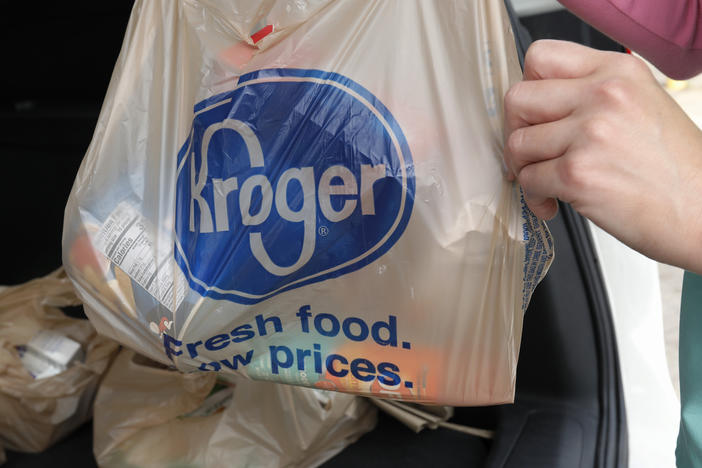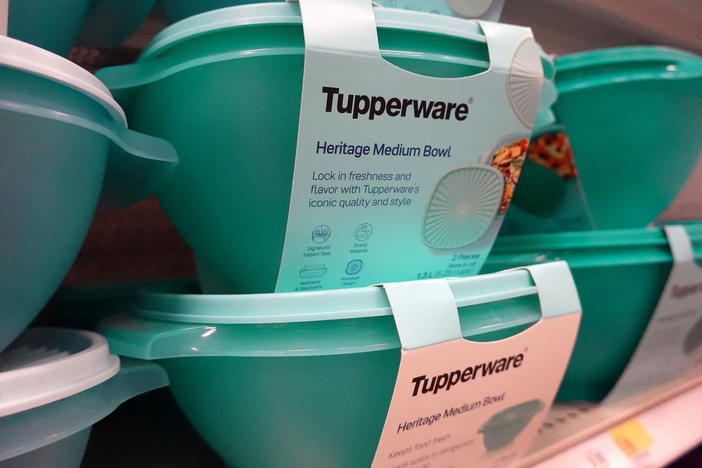Section Branding
Header Content
In Affluent Maryland County, Pandemic Exacerbates Food Insecurity
Primary Content
Since March, the number of people who lack a steady source of food has grown. In Montgomery County, a food assistance effort often runs out of prepared meals before it can feed everyone in need.
Transcript
MICHEL MARTIN, HOST:
So what does food insecurity look like and feel like for the 1 in 6 people who are projected to experience it this year? We went to find out.
JOHN ROSS: I need one more volunteer to load cars.
MARTIN: On a Friday earlier this month, we visited a food distribution site in Bethesda, Md. It's in Montgomery County, which is one of the wealthiest counties in the country. But as in many places, the need for food has grown since the beginning of the pandemic.
ROSS: People will line up and come right around here. You'll see they've already started lining up.
MARTIN: Before the distribution is set to begin, volunteers like John Ross are unloading some of the more than 200 boxes of food to be handed out. Stacks of bread are piled high on one table, prepared meals and bags of coffee on the other.
ROSS: It's been shocking to, I think, all of us to see this on the ground right here, right now. So we're doing the best we can.
MARTIN: An hour before the event is scheduled to begin, a long line of cars is already winding through the parking lot at the Bethesda-Chevy Chase Rescue Squad, a volunteer firefighting group that loaned out their space. We met Peter Warner while he was waiting in his car.
PETER WARNER: Last week, I arrived here at 20 minutes after 1. There were a quarter-mile worth of cars in line. I was fortunate to get a spot, and they had almost run out of food 20 minutes after the starting bell. Anyone who got here after 1:30 p.m. was totally out of luck.
MARTIN: Warner arrived early this time. He works part-time at Safeway and receives a monthly disability check of a thousand dollars. That has to cover all of his basics - rent, medicine, keeping his car running and, of course, food.
WARNER: I also am now getting $194 a month in SNAP food stamps, which is invaluable. But today is the 18. My food stamp award comes in on the 22. I have to eat for the next four days.
MARTIN: As we spoke to people, the line of cars kept growing, eventually snaking down the busy street outside the parking lot.
UNIDENTIFIED PERSON: How many families? OK, two here.
MARTIN: Many of the people we talked with in line didn't want to say much about their situation. It seemed like a source of shame and pain. One or two said that falling short on food even for a couple of days a month was a chronic problem in an area where the cost of living is high. But most of the people we spoke with said the coronavirus pandemic or the steps taken to contain it was the main reason they needed help with food right now.
Linda is one of them. She was picking up food for her daughter and five grandchildren. Before the pandemic, she worked as a housekeeper.
LINDA: I laid off since May. I'm trying to apply for unemployment if I can.
MARTIN: That unemployment application has yet to be approved, and five months without work or any financial aid is taking its toll.
LINDA: It's too difficult, really. I'm struggling. I hope the pandemic - it's finished soon. You know, it's so difficult. But we are still blessed to have somebody to provide some food for us, so we will still thanks to God.
MARTIN: We also met Adam. He's a father of two. He and his wife are both collecting unemployment and seeking food assistance for the first time in their lives.
ADAM: Both me and my wife are on furlough since March. And now just with the extended benefits down, it's just - it's - yeah, the money is very - it's a lot lower now, so it helps. You know, any little bit helps now because you never know what's going to happen tomorrow or the next day. So it's good just to be prepared for it because you never know how long this is going to last.
MARTIN: There hadn't been any food distribution in the Bethesda-Chevy Chase area until August. That's when Andrew Friedson, the Montgomery County council member for the area, brought together a coalition of nonprofit, commercial and faith-based groups to distribute food. You can hear that we're both talking through our masks.
This is an affluent area. Montgomery County is affluent in Maryland, and - which means it's one of the most affluent areas in the country. So when did you realize that you really did need something like that?
ANDREW FRIEDSON: Well, it has always been needed. I think there's more poverty in Montgomery County and even in places like Bethesda than people realize in normal times. And during COVID, it has just gone through the roof, the challenges that we face.
MARTIN: But Friedson says, since the start of the pandemic, the need for help with food and rent are the two biggest issues his office is hearing about from constituents.
FRIEDSON: We desperately need federal government support. The CARES Act was great. That's largely what is funding the public efforts on these - the CARES Act funding, the $183 million that the county has received. But it's nowhere near enough.
MARTIN: And while feeding those in need is the goal of this distribution event, volunteer John Ross says it's about more than just the food.
ROSS: What we want to do out here too is show people that people care. It's not just the calories, but it's the care that comes along with this, too - that we're all together in this, and we all need to be part of that.
(SOUNDBITE OF ANDREW BIRD'S "BLOODLESS") Transcript provided by NPR, Copyright NPR.
Bottom Content



